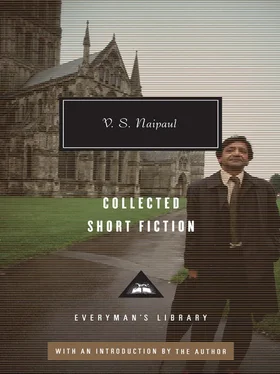It was as if Bogart had never come to Miguel Street. And after all Bogart had been living in the street only for four years or so. He had come one day with a single suitcase, looking for a room, and he had spoken to Hat who was squatting outside his gate, smoking a cigarette and reading the cricket scores in the evening paper. Even then he hadn’t said much. All he said — that was Hat’s story — was, ‘You know any rooms?’ and Hat had led him to the next yard where there was this furnished servant-room going for eight dollars a month. He had installed himself there immediately, brought out a pack of cards, and begun playing patience.
This impressed Hat.
For the rest he had always remained a man of mystery. He became Patience.
When Hat and everybody else had forgotten or nearly forgotten Bogart, he returned. He turned up one morning just about seven and found Eddoes and a woman on his bed. The woman jumped up and screamed. Eddoes jumped up, not so much afraid as embarrassed.
Bogart said, ‘Move over. I tired and I want to sleep.’
He slept until five that afternoon, and when he woke up he found his room full of the old gang. Eddoes was being very loud and noisy to cover up his embarrassment. Hat had brought a bottle of rum.
Hat said, ‘What happening there, Bogart?’
And he rejoiced when he found his cue taken up. ‘What happening there, Hat?’
Hat opened the bottle of rum, and shouted to Boyee to go buy a bottle of soda water.
Bogart asked, ‘How the cows, Hat?’
‘They all right.’
‘And Boyee?’
‘He all right too. Ain’t you just hear me call him?’
‘And Errol?’
‘He all right too. But what happening, Bogart? You all right?’
Bogart nodded, and drank a long Madrassi shot of rum. Then another, and another; and they had presently finished the bottle.
‘Don’t worry,’ Bogart said. ‘I go buy another.’
They had never seen Bogart drink so much; they had never heard him talk so much; and they were alarmed. No one dared to ask Bogart where he had been.
Bogart said, ‘You boys been keeping my room hot all the time?’
‘It wasn’t the same without you,’ Hat replied.
But they were all worried. Bogart was hardly opening his lips when he spoke. His mouth was twisted a little, and his accent was getting slightly American.
‘Sure, sure,’ Bogart said, and he had got it right. He was just like an actor.
Hat wasn’t sure that Bogart was drunk.
In appearance, you must know, Hat recalled Rex Harrison, and he had done his best to strengthen the resemblance. He combed his hair backwards, screwed up his eyes, and he spoke very nearly like Harrison.
‘Damn it, Bogart,’ Hat said, and he became very like Rex Harrison. ‘You may as well tell us everything right away.’
Bogart showed his teeth and laughed in a twisted, cynical way.
‘Sure I’ll tell,’ he said, and got up and stuck his thumbs inside his waistband. ‘Sure, I’ll tell everything.’
He lit a cigarette, leaned back in such a way that the smoke got into his eyes; and, squinting, he drawled out his story.
He had got a job on a ship and had gone to British Guiana. There he had deserted, and gone into the interior. He became a cowboy on the Rupununi, smuggled things (he didn’t say what) into Brazil, and had gathered some girls from Brazil and taken them to Georgetown. He was running the best brothel in the town when the police treacherously took his bribes and arrested him.
‘It was a high-class place,’ he said, ‘no bums. Judges and doctors and big shot civil servants.’
‘What happen?’ Eddoes asked. ‘Jail?’
‘How you so stupid?’ Hat said. ‘Jail, when the man here with we. But why you people so stupid? Why you don’t let the man talk?’
But Bogart was offended, and refused to speak another word.
From then on the relationship between these men changed. Bogart became the Bogart of the films. Hat became Harrison. And the morning exchange became this:
‘Bogart!’
‘Shaddup, Hat!’
Bogart now became the most feared man in the street. Even Big Foot was said to be afraid of him. Bogart drank and swore and gambled with the best. He shouted rude remarks at girls walking by themselves in the street. He bought a hat, and pulled down the brim over his eyes. He became a regular sight, standing against the high concrete fence of his yard, hands in his pockets, one foot jammed against the wall, and an eternal cigarette in his mouth.
Then he disappeared again. He was playing cards with the gang in his room, and he got up and said, ‘I’m going to the latrine.’
They didn’t see him for four months.
When he returned, he had grown a little fatter but he had become a little more aggressive. His accent was now pure American. To complete the imitation, he began being expansive towards children. He called out to them in the streets, and gave them money to buy gum and chocolate. He loved stroking their heads, and giving them good advice.
The third time he went away and came back he gave a great party in his room for all the children or kids, as he called them. He bought cases of Solo and Coca-Cola and Pepsi-Cola and about a bushel of cakes.
Then Sergeant Charles, the policeman who lived up Miguel Street at number forty-five, came and arrested Bogart.
‘Don’t act tough, Bogart,’ Sergeant Charles said.
But Bogart failed to take the cue.
‘What happening, man? I ain’t do anything.’
Sergeant Charles told him.
There was a little stir in the papers. The charge was bigamy; but it was up to Hat to find out all the inside details that the newspapers never mention.
‘You see,’ Hat said on the pavement that evening, ‘the man leave his first wife in Tunapuna and come to Port of Spain. They couldn’t have children. He remain here feeling sad and small. He go away, find a girl in Caroni and he give she a baby. In Caroni they don’t make joke about that sort of thing and Bogart had to get married to the girl.’
‘But why he leave she?’ Eddoes asked.
‘To be a man, among we men.’
2. THE THING WITHOUT A NAME
THE ONLY THING that Popo, who called himself a carpenter, ever built was the little galvanized-iron workshop under the mango tree at the back of his yard. And even that he didn’t quite finish. He couldn’t be bothered to nail on the sheets of galvanized iron for the roof, and kept them weighted down with huge stones. Whenever there was a high wind the roof made a frightening banging noise and seemed ready to fly away.
And yet Popo was never idle. He was always busy hammering and sawing and planing. I liked watching him work. I liked the smell of the woods — cyp and cedar and crapaud. I liked the colour of the shavings, and I liked the way the sawdust powdered Popo’s kinky hair.
‘What you making, Mr Popo?’ I asked.
Popo would always say, ‘Ha, boy! That’s the question. I making the thing without a name.’
I liked Popo for that. I thought he was a poetic man.
One day I said to Popo, ‘Give me something to make.’
‘What you want to make?’ he said.
It was hard to think of something I really wanted.
‘You see,’ Popo said. ‘You thinking about the thing without a name.’
Eventually I decided on an egg-stand.
‘Who you making it for?’ Popo asked.
‘Ma.’
He laughed. ‘Think she going use it?’
My mother was pleased with the egg-stand, and used it for about a week. Then she seemed to forget all about it, and began putting the eggs in bowls or plates, just as she did before.
And Popo laughed when I told him. He said, ‘Boy, the only thing to make is the thing without a name.’
After I painted the tailoring sign for Bogart, Popo made me do one for him as well.
Читать дальше









